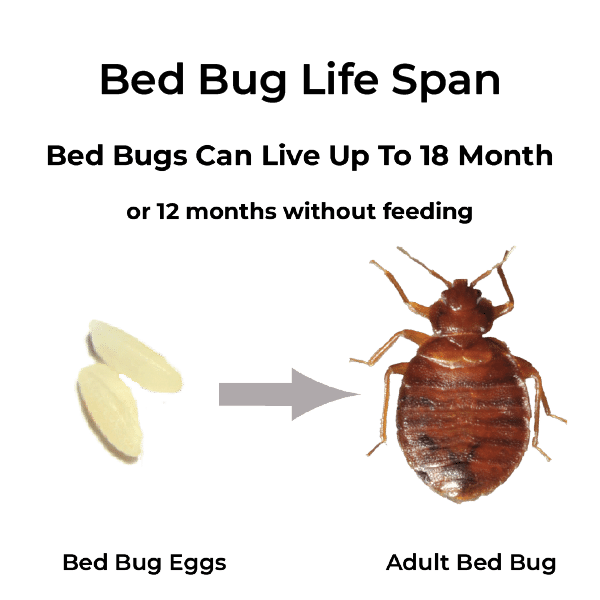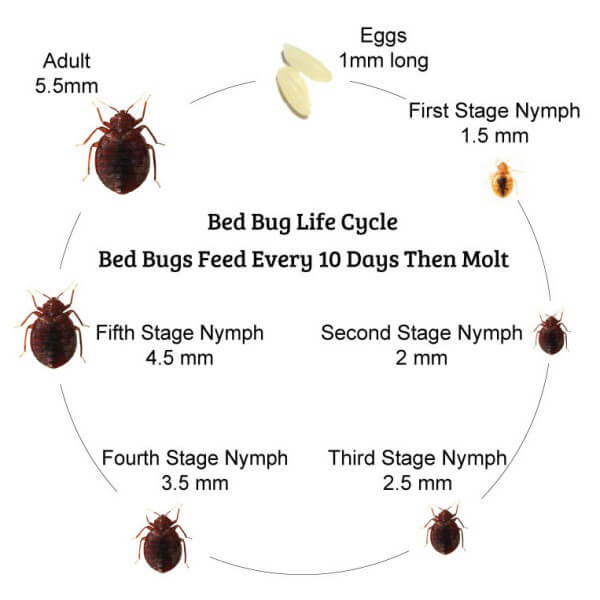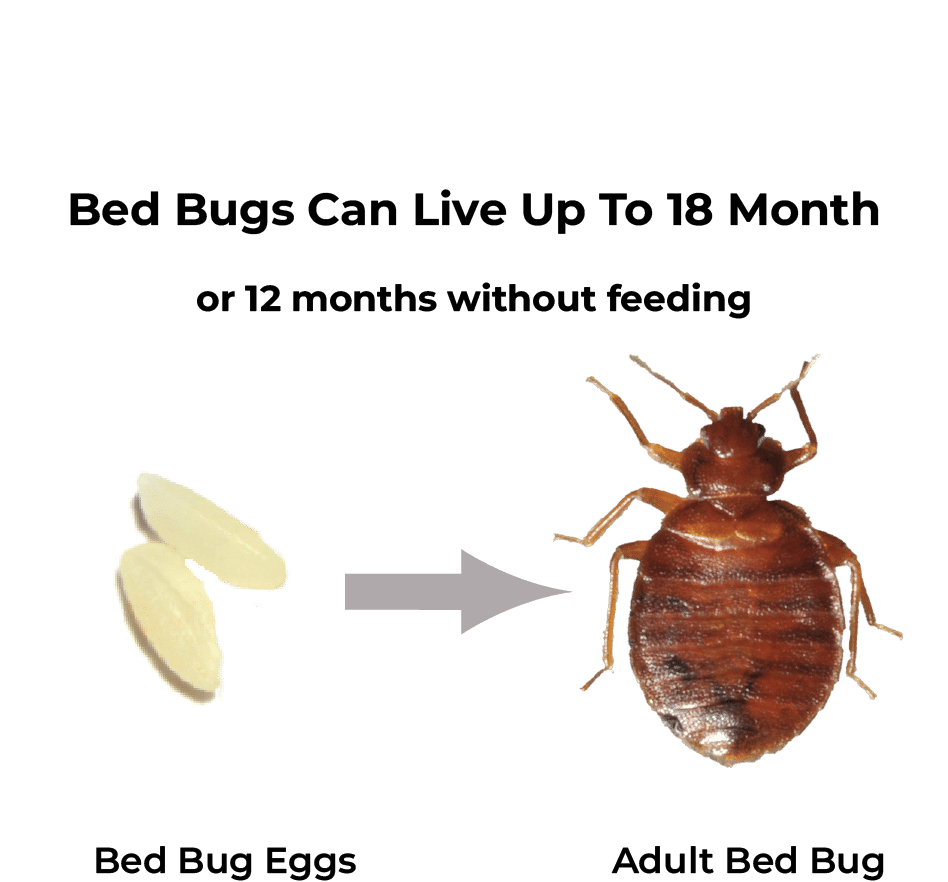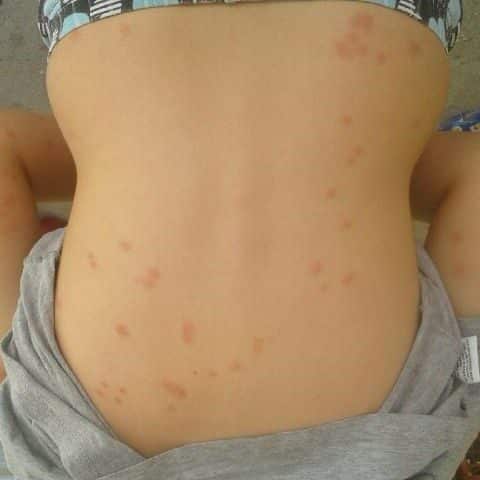
In the article
Bed Bugs Lifespan – How Long Do Bed Bugs Live?
Adult bed bugs can survive for over a year without a blood meal, and for up to 18 months if they have fed, particularly in cooler conditions. In contrast, young nymphs can only last a few weeks to a few months without feeding.
Knowing “how long do bed bugs live?” is key to kicking them out for good. Let’s break down their life cycle and see what we’re up against.
Life Cycle of Bed Bugs
Bed bugs go through a few stages from egg to adult. Each stage has its own quirks and timeline.
| Life Stage | Description | Duration |
|---|---|---|
| Egg | Tiny, white, and oval. Hidden in cracks and crevices. | 6-10 days |
| Nymph (1st Instar) | Just hatched, see-through, and pinhead-sized. Needs blood to grow. | 5-10 days |
| Nymph (2nd Instar) | A bit bigger and darker. Still hungry for blood. | 5-10 days |
| Nymph (3rd Instar) | Keeps growing with each molt. Needs more blood. | 5-10 days |
| Nymph (4th Instar) | Almost adult size, still feeding. | 5-10 days |
| Nymph (5th Instar) | Last nymph stage, nearly an adult. | 5-10 days |
| Adult | Fully grown and ready to reproduce. Can live 6-18 months, depending on conditions. | Up to 6-18 months |
A single bed bug can lay up to 500 eggs in its lifetime. From egg to adult, the whole process can take just a month if conditions are right. But things like temperature and food availability can stretch out each stage.
Want to know more about where these pests come from? Check out our article on where do bed bugs come from?.
Curious about how they got into your home? Visit how did I get bed bugs?.

Bed Bug Life Cycle
Understanding their life cycle helps you plan better prevention and control measures.
What Affects Bed Bugs Lifespan?
Knowing what makes bed bugs tick can help you squash them for good. The two biggies that determine how long these pests stick around are their environment and how often they get to feast.
Environmental Conditions
Where bed bugs hang out has a huge impact on how long they live. These little critters are tough, but some conditions can either stretch or cut short their lifespan.
- Temperature: Bed bugs love it when it’s between 68°F and 86°F. In this sweet spot, they can live up to six months. But crank up the heat above 113°F, and they’re toast. On the flip side, if it gets colder than 55°F, they go into a kind of hibernation, which can make them live longer.
- Humidity: They do best in places with moderate humidity. Too much moisture helps them avoid drying out, while too little can make them shrivel up and die faster.
- Shelter: Bed bugs are pros at hiding. They love dark, hidden spots like mattress seams, bed frames, and furniture. These hideouts keep them safe from extreme weather and predators, helping them live longer.
| Environmental Condition | Effect on Lifespan |
|---|---|
| Ideal Temperature (20°C to 30°C) | Up to 6 months |
| Cold Temperature (below 12°C) | Prolongs lifespan via hibernation |
| Hot Temperature (above 45°C) | Reduces lifespan, often lethal |
Want to know more about where these pests come from? Check out where do bed bugs come from?.
Feeding Habits
How often bed bugs get to eat is just as important as where they live. They need blood to grow, reproduce, and stay alive.
- Feeding Frequency: Bed bugs usually feed every 5 to 10 days. If they get regular meals, they can live for several months. If not, their days are numbered.
- Host Availability: They need a host to survive. Bed bugs are drawn to carbon dioxide and body heat. If there’s always a host around, they can feed more often, which helps them live and reproduce.
- Nutritional Needs: Bed bugs can go months without eating if it’s cool enough. But eventually, no food means no life.
| Feeding Habit | Effect on Lifespan |
|---|---|
| Regular Feeding (5-10 days) | Extends lifespan to several months |
| Irregular Feeding | Shortens lifespan |
| Host Availability | Boosts survival and reproduction |
Curious about how bed bugs get into homes and businesses? Check out how did I get bed bugs?

Signs of Bed Bug Infestation
Spotting bed bugs early is key to kicking them out for good. Let’s break down the clues and symptoms that scream “bed bugs!
Physical Evidence
You don’t need a magnifying glass to find bed bugs. Just keep your eyes peeled for these telltale signs:
- Tiny Dark Spots: Bed bug poop looks like little ink dots on your sheets, mattress, or furniture.
- Shed Skins: As they grow, bed bugs leave behind their old skins. You’ll find these near their hideouts.
- Blood Stains: Squished bed bugs leave small blood spots on your bedding.
- Live Bed Bugs: Adult bed bugs are about the size of an apple seed and visible to the naked eye.
| Evidence Type | Description |
|---|---|
| Tiny Dark Spots | Little ink-like dots on bedding and furniture |
| Shed Skins | Leftover exoskeletons from growing bed bugs |
| Blood Stains | Small blood spots on sheets or mattresses |
| Live Bed Bugs | Visible adult bed bugs, about the size of an apple seed |
Bites and Skin Reactions
Bed bug bites are another big clue. They usually show up in clusters or lines and can cause various skin reactions.
- Itchy Red Bumps: These bites often leave small, itchy red bumps on your skin.
- Swelling and Inflammation: Some folks get swelling and inflammation around the bite area.
- Allergic Reactions: Rarely, bed bug bites can cause severe allergic reactions, leading to larger welts and intense itching.
| Symptom | Description |
|---|---|
| Itchy Red Bumps | Small, itchy red bumps on the skin |
| Swelling and Inflammation | Swelling around the bite area |
| Allergic Reactions | Severe reactions, including large welts and intense itching |
Spotting these signs early can help you tackle a bed bug problem fast. If you’re dealing with these pests, our guide on bed bugs Melbourne Australia has got your back with tips and solutions.

Bed Bug Bites
Keep Bed Bugs Out: Tips and Tricks
How to Prevent Bed Bugs
Nobody wants bed bugs crashing their place. Here’s how to keep them out:
- Check Regularly: Give your home a once-over, especially where you sleep. Look at mattress seams, headboards, and furniture nooks for any signs of bed bugs.
- Declutter: Less mess means fewer places for bed bugs to hide. Keep your space neat and tidy.
- Protective Covers: Use bed bug-proof covers for your mattress and pillows. These covers trap any bugs inside and keep new ones out.
- Smart Travel Habits: When you’re on the road, inspect hotel rooms for bed bugs. Don’t put your luggage on the bed or floor. Use luggage racks and check your stuff before heading home.
- Laundry Care: Wash and dry your bed linens, curtains, and clothes on high heat. This kills any bed bugs hiding in them.
- Seal Cracks: Seal up any cracks in walls, floors, and furniture where bed bugs might sneak in.
Want more tips? Check out our article on where do bed bugs come from?.
How to Get Rid of Bed Bugs
Got bed bugs? Here’s how to kick them out:
| Treatment | What It Does |
|---|---|
| Bed Bug Killer Powder | Kills bed bugs and eggs permanently because it remains active for many years. |
| Heat Treatment | Professionals heat the room to a temperature that kills bed bugs. |
| Cryonite Treatment | This method uses carbon dioxide snow to freeze and kill bed bugs. It’s non-toxic and safe around people and pets. |
| Vacuuming | Regularly vacuum mattresses, bed frames, and nearby areas. Dispose of the vacuum bag right away to avoid re-infestation. |
| Steam Cleaning | Steam can penetrate mattresses and furniture, killing bed bugs and their eggs. |
Frequenly Asked Questions:
- How long do bed bugs survive without a host?
Adults bed bugs can survive for over a year without a blood meal, especially in cooler conditions, while young nymphs last a few weeks to months. - Do bed bugs ever go away?
Bed bugs don’t go away on their own. They’ll keep breeding and spreading unless treated. Effective treatment is key to eliminating them and preventing their return. - Is it possible to only have a few bed bugs?
Yes, early infestations may only have a few bed bugs. However, they can multiply quickly if not addressed. It’s crucial to act fast to prevent a larger problem.
By following these tips and using the right DIY treatments, you can keep your home bed bug-free and comfy.
Are You Looking for an Organic DIY Treatment?



Leave a Reply